|
Several people attended the event in the atrium at the Lincoln
Center to mark the anniversary of the attack on Pearl Harbor, which
was the launching point of the U.S. in World War II.

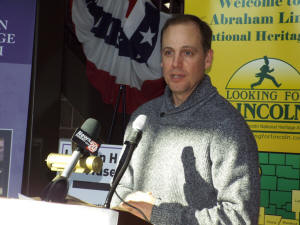
The day began with Museum Director Anne Moseley welcoming guests and
calling upon Pastor Darren Palmer. In his opening prayer Pastor
Palmer remembered our service men currently serving, as well as
those who served in World War II.
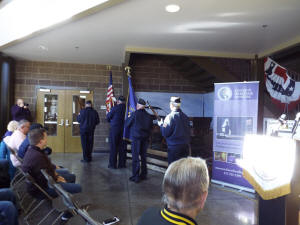
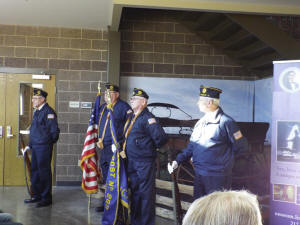
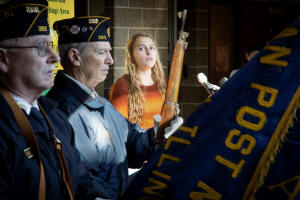
The American Legion Post 263 Color Guard presented the flag and the
group stood to recite the Pledge of Allegiance.
Lincoln Community High School student Sydney Worth then sang the
National Anthem.
Moseley served as the keynote speaker for the day. She addressed the
impact that World War II had on the local community and specifically
on the students of Lincoln College. She read excerpts from a
collection of papers including an editorial written in the
Lincolnian, the college newspaper at the time.

Moseley recalled to the audience that in 1941 the college president
was President Copeland. It was the decade in which Lincoln College
would transform from a four-year institute to a two-year Junior
College, and it was the year that Judge Lawrence Stringer died. She
noted that Stringer had been a renowned historian and that upon his
death a large collection of his papers had been left to the college.
Moseley also spoke about the impact that the war had on all people
of Japanese descent. She said that it was a difficult time for
everyone including the Japanese who were residing in United States
and had no real part in the bombing.
She said that hate abounded throughout our country and there was
much bitterness and call for revenge on Japan and that it seeped
into the lives of everyone.
Those who were of Japanese descent living in America were not
treated well at all, and those who were in business suffered
terrible losses financially because of their ancestry.
[to top of second column] |

She said that the world was not in a good place mentally and
emotionally during that time and those bad feelings did not go
unnoticed by students at Lincoln College.
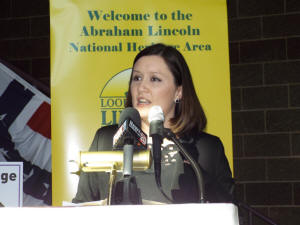
She read excerpts from a student-written editorial that appeared in
the Lincolnian. The editorial was entitled “Think.”
“There are those who are saying that the time for considering right
and wrong or to hold attitudes toward war has passed. Their
contention that we must give our government 100 percent cooperation
in the mobilization movement goes practically unquestioned. But
there is a difference between intelligent patriotism and blind
following.

“The time for thinking is not past. On the contrary, never was it
more important that we think and think carefully. Already the
propaganda machine has begun its work. The results of the
questionnaires show that some Lincoln College students approve
crushing those nations with ideas different from ours, arresting all
Japanese regardless of status in this country. America is talking
revenge for Pearl Harbor. Ministers are evoking the aid of God in
our Holy cause. Japanese owned businesses are reported in danger
from mobs on the west coast. Men are beginning to say ‘What the
heck? What is morality in war?’
“In times like these it is the duty of everyone who considers
himself patriotic to think things through, to refuse to become a
victim of rumor or ‘world gone mad.’ It is his duty to approach this
war in cold logic without hate in his heart for any nation or
people. The greatest danger to our way of life is that in attempting
to defend, we adopt the method of those whose way we most abhor.
Methods of hate and feat and blind following be this our prayer,
“God keep us from hate.”
Moseley noted that these were college students who were in their
first two years of school and were thinking not just about
themselves, but about their community and their nation. They
realized the value of independent thought and were encouraging all
to not follow blindly, but to pray and have a heart for others.
Mosely said these young minds would go on to support the war and
their country, but they would do so enlightened and informed. As
they proceeded through the war years, they advertised for bonds to
support the causes of the war while at the same time maintaining
their right to voice their feelings and opinions about the war.
Mosely said she was proud of those students who stood on their own
beliefs and encouraged all of us to think for ourselves and to be
enlightened supporters and not just blind followers and to also
cared for all those around them - the soldiers, the soldiers lost,
the widows and the families.
Mosely asked that everyone take the time today to think about
country and our patriotic duty, and to also think about those young
students in 1941 who called us to all show our support for our
country, but to also remember how our character shapes the future of
our country.

Following Moseley’s address, LCHS student Eli Morris played taps
from the second floor of the atrium, then the color guard was
dismissed. Guests were encouraged to spend the rest of the afternoon
visiting the Lincoln Heritage Museum.
[Nila Smith with photos by Smith and Mark Gordon] |